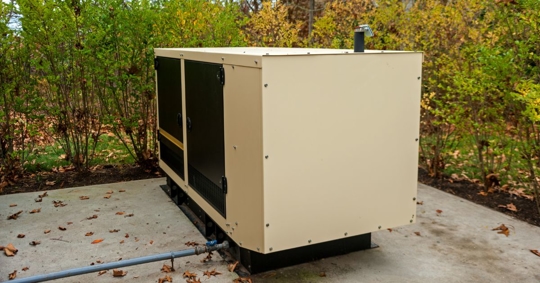Signs Your Home Needs a Backup Power Source
In today's world, where our daily lives are increasingly dependent on electricity, having a reliable power source is more important than ever. Frequent power outages can wreak havoc on your daily routine, affecting everything from your ability to cook meals to working from home. Moreover, power outages can compromise the safety and security of your home, leaving you vulnerable without a functioning security system. Imagine being in the middle of a crucial work deadline or a family gathering when the lights go out – a scenario that can be avoided with a residential generator. By investing in a backup power source, you can ensure that your household remains functional and secure, no matter what Mother Nature throws your way.
Beyond the immediate inconveniences, power outages can also impact your home's comfort and convenience. During a blackout, essential systems like heating, cooling, and refrigeration can become inoperative, leading to uncomfortable living conditions and potential food spoilage. For families with young children, elderly members, or individuals with medical needs, maintaining a comfortable environment is crucial. A residential generator can provide peace of mind, ensuring that your home remains a safe haven even during extended power interruptions. By understanding the signs that your home needs a backup power source, you can take proactive steps to safeguard your family's well-being and maintain your quality of life.
Evaluating Your Home's Power Needs
Assessing your home's power needs is a critical step in selecting the right generator. Start by identifying the essential appliances and systems that require backup power, such as refrigerators, HVAC systems, and medical equipment. Once you've determined your priorities, calculate the total wattage requirements to ensure your generator can handle the load. This process involves adding up the wattage of each appliance and considering any additional power needed for startup surges. By accurately evaluating your home's power needs, you can choose a generator that provides adequate coverage without overloading the system.
When it comes to choosing between whole-house generators and portable options, it's important to understand the differences. Whole-house generators are permanently installed and can power your entire home, offering seamless transition during outages. They are typically fueled by natural gas or propane, providing a continuous power supply. On the other hand, portable generators are more affordable and versatile, but they require manual setup and can only power select appliances. By weighing the pros and cons of each option, you can make an informed decision that aligns with your budget and power needs.
Seasonal Considerations for Installation
Timing is everything when it comes to installing a residential generator. Certain times of the year are more favorable for installation due to weather patterns and demand. For instance, spring and fall offer milder weather conditions, making it easier for technicians to work without the challenges posed by extreme temperatures. Additionally, scheduling your installation during these off-peak seasons can result in cost savings and increased availability of installation services. By planning ahead and considering seasonal factors, you can ensure a smooth installation process and avoid potential delays.
However, it's important to be aware of potential challenges during peak seasons like hurricane or winter storm seasons. During these times, the demand for generator installations can spike, leading to longer wait times and higher costs. Furthermore, adverse weather conditions can complicate the installation process, potentially causing delays. By opting for an off-season installation, you can avoid these challenges and enjoy the benefits of having a generator ready before the next storm hits. Taking a proactive approach to timing your installation can make all the difference in ensuring your home's preparedness.
Recognizing Urgent Situations
In some cases, immediate generator installation may be necessary due to urgent situations. For households with individuals who rely on medical equipment, a power outage can pose serious health risks. Similarly, if your local infrastructure is prone to frequent outages, having a generator installed promptly can prevent disruptions to your daily life. Recognizing these scenarios and acting quickly can help you avoid potential hazards and maintain your household's stability.
Emergency installation services are available for those who find themselves in urgent need of a generator. These services prioritize quick response times and efficient installation to ensure your home is equipped with backup power as soon as possible. When opting for emergency installation, it's important to understand what to expect, including potential costs and the timeline for completion. By being prepared and informed, you can navigate urgent situations with confidence and ensure your home remains powered and protected.
Types of Residential Generators
Selecting the right generator for your home involves understanding the different types available and how they fit your needs. Standby generators are a popular choice for homeowners seeking a reliable, automatic backup power solution. These generators are permanently installed and connected to your home's electrical system, providing seamless power during outages. Portable generators, on the other hand, offer flexibility and affordability, making them ideal for temporary power needs or smaller homes. Inverter generators are another option, known for their quiet operation and fuel efficiency, making them suitable for sensitive electronics and smaller loads.
Each type of generator comes with its own set of pros and cons. Standby generators offer the convenience of automatic operation and can power your entire home, but they require a higher upfront investment. Portable generators are more budget-friendly and versatile, but they require manual setup and can only power select appliances. Inverter generators are compact and efficient, but they may not provide enough power for larger homes. Additionally, consider the fuel options available, such as natural gas, propane, diesel, and solar-powered generators. By weighing these factors, you can choose the generator that best meets your home's power needs and your personal preferences.
Factors to Consider When Selecting a Generator
When selecting a generator, several factors should be taken into account to ensure you make the right choice. Budget is a primary consideration, as generators can vary significantly in price. It's important to balance your budget with the features and capabilities you need. Noise levels are another factor, especially if you live in a densely populated area where a loud generator could disturb neighbors. Additionally, consider the space available for installation, as some generators require more room than others.
Brand reputation, warranty, and customer support are also important considerations. Choosing a reputable brand with a strong warranty can provide peace of mind and ensure you receive reliable service if issues arise. Professional consultations can be invaluable in guiding your decision-making process, offering expert advice tailored to your home's specific needs. By considering these factors, you can make an informed decision and select a generator that provides reliable backup power for your home.
Site Assessment and Permitting
Before installing a generator, a professional site assessment is essential to determine the optimal placement for your unit. This assessment takes into account factors such as proximity to fuel sources, ventilation requirements, and noise considerations. Proper placement ensures your generator operates efficiently and safely, minimizing the risk of hazards. Additionally, a site assessment can help identify any potential challenges that may arise during installation.
The permitting process is another crucial step in preparing for generator installation. Local regulations may require permits for electrical work and generator installation, ensuring compliance with safety standards. Working with local authorities and your installation team can help streamline the permitting process and avoid delays. By understanding the requirements and obtaining the necessary permits, you can ensure a smooth installation process and avoid potential legal issues.
Pre-Installation Checklist
Preparing your home for generator installation involves several key steps to ensure a seamless process. Start by clearing space around the installation site, ensuring there is adequate room for the generator and any necessary equipment. Accessibility is also important, as technicians will need clear access to the installation area. Coordinating with utility companies is another critical step, as they may need to disconnect power temporarily during installation.
Creating a timeline for preparation activities can help keep the process on track and ensure everything is ready for installation day. This timeline should include tasks such as site preparation, permit acquisition, and coordination with utility providers. By following a pre-installation checklist, you can ensure your home is ready for the installation process and avoid any last-minute surprises.
Routine Maintenance and Testing
Once your generator is installed, routine maintenance is essential to ensure its reliability and longevity. Regular maintenance tasks include checking fluid levels, inspecting connections, and replacing worn parts. It's important to follow the manufacturer's recommended service intervals to keep your generator in optimal condition. Additionally, periodic testing and load exercises can help identify any potential issues before they become major problems.
Routine maintenance not only ensures your generator is ready when you need it but also extends its lifespan, protecting your investment. By staying on top of maintenance tasks and scheduling regular service appointments, you can enjoy peace of mind knowing your home is protected during power outages. Whether you choose to handle maintenance yourself or enroll in a maintenance plan with your installer, keeping your generator in top shape is key to its performance.
Understanding Warranty and Service Agreements
Understanding your generator's warranty and service agreements is crucial for protecting your investment and ensuring reliable performance. When reviewing warranty options, look for coverage that includes parts and labor, as well as the duration of the warranty period. A comprehensive warranty can provide peace of mind and financial protection in the event of unexpected repairs.
Enrolling in a maintenance plan with your installer can offer additional benefits, such as priority service and discounted rates on repairs. These plans often include regular maintenance visits and inspections, helping to keep your generator in peak condition. If issues arise, troubleshooting common problems can help identify simple fixes, but knowing when to call for professional help is equally important. By understanding your warranty and service agreements, you can ensure your generator remains a reliable source of backup power for your home.
Knee's Electrical Service Are Your Go-To Generator Pros
Investing in a residential generator is a smart decision for homeowners who experience frequent power outages or have critical power needs. By understanding the need for a backup power source, evaluating your home's power requirements, and choosing the right generator, you can ensure your home remains safe and comfortable during outages. Proper preparation and post-installation maintenance are key to maximizing your generator's performance and longevity.
At Knee's Electrical Service, we specialize in providing expert generator installation and maintenance services to homeowners. Our team of experienced professionals is dedicated to helping you select the right generator for your needs and ensuring a seamless installation process. Contact us today to learn more about our services and how we can help you protect your home with a reliable backup power solution.
Call Knee's Electrical Service now at (765) 201-7220 or contact us online.

